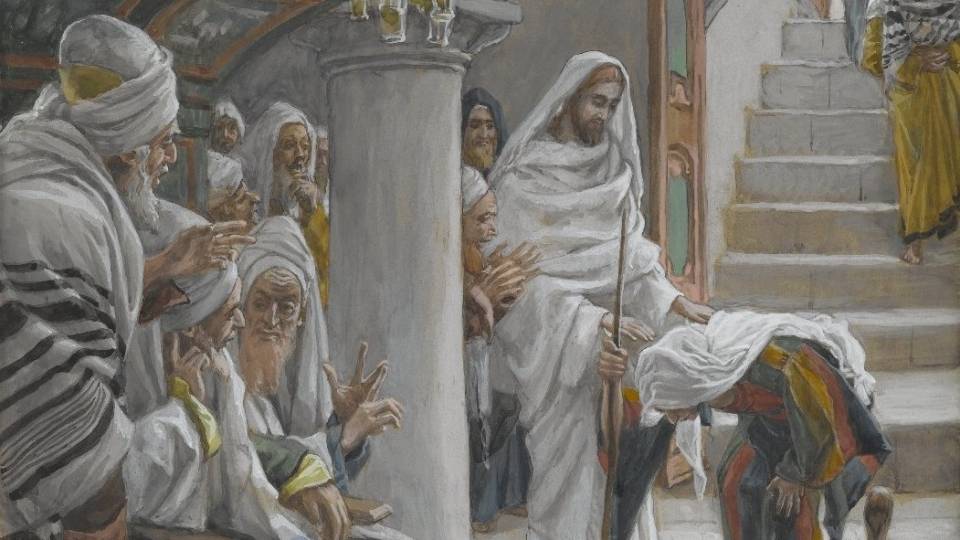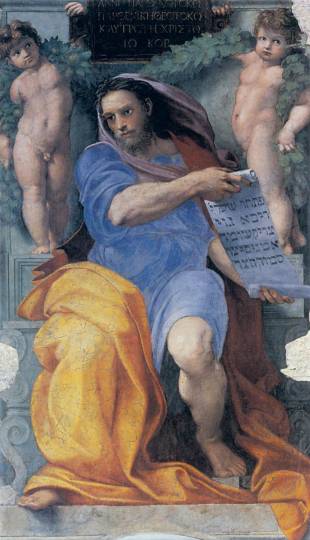

Humble and heavenly: Salt and light, and the prophets
Scott Harris
Friday, February 7, 2020

Detail of Christ Healing an Infirm Woman on the Sabbath by James Tissot (Source: Wikimedia Commons)
When I went to check what the readings were for Sunday February 9th, I noticed a few interesting things. The Gospel passage is Matthew 5:13-16 – the passage about Salt and Light, after which our organization is named. The Old Testament reading is a passage from Isaiah that expresses many of the central teachings of the Hebrew Scriptures and the ministry of Jesus which are reflected in the New Testament many times.
Let’s take a closer look at these passages, and what they mean for Christianity.
If I had to pick a favourite part of the Old Testament, or even a favourite section of the whole Bible, it might be the prophetic books. I think they express the core message of the Judeo-Christian tradition the most directly, explicitly describing what God expects from the covenant with Israel and how people have fallen short. Some parts of Scripture can be vague and open to interpretation, and some only make sense if you understand the specific context in which they were written. The books of the prophets are definitely products of a certain context, particularly the exile of the Hebrew people in Babylon. However, they also powerfully express the covenant of the people of Israel with their God.
There is a common misconception that the perception of God shifts from a jealous, angry deity in the Old Testament to a softer, more loving understanding of God mediated through Jesus in the New Testament. But the prophets show us that God is consistent in both Testaments. Sunday’s reading from Isaiah 58:7-10 describes how God asks his people to share their bread with the hungry, shelter the homeless, and clothe the naked. Isaiah expresses that contributing to oppression is what put a barrier between humanity and God, and that striving for justice and removing oppression uncovers our own light by being in harmony with God.
This passage is very similar to what Jesus says in Matthew 25:35-40, where he says that the righteous who are blessed by the Father are the ones who have fed the hungry, clothed the naked, cared for the sick, and so on. The words of Jesus echo the words of the prophets in how they express that caring for the vulnerable is a crucial part of humanity’s covenant with God. To be in harmony with God is also to be in harmony with each other and all of God’s creation. As Jesus says in chapter 22 of the Gospel of Matthew, all of the Law and Prophets hang on two commandments: to love God and to love your neighbour as yourself. Everything about the Old Testament Scriptures and the ministry of Christ is summed up in these two inseparable commandments.
The teaching that love for God is expressed through loving one’s neighbour is a major theme for all of the prophets. The Book of Amos is another one that is known for advocating justice, chastising the people of Israel for trampling the poor and needy, and telling us that God cares nothing about festivals and offerings if there is injustice. Isaiah expresses the same idea, that God requires humanity to care for those who are hungry, sick, and without shelter, and to do away with oppression.
The Gospel passage from Matthew 5:13-16 is where Jesus tells his followers that they are the salt of the earth and the light of the world, uniting the duality of something humble extracted from the earth, and something celestial and heavenly. Salt loses its worth if it loses its taste, implying that followers of Christ need to hold on to their distinctiveness from the rest of the fallen world, which holds up structures of oppression. As the light of the world, Christians are meant to be examples of people who glorify God through good works, illuminating the way for others.
This Sunday is the third Sunday before Ash Wednesday and the beginning of Lent, called “Septuagesima” before the 1960s. It begins the Pre-Lenten season called Shrove-Tide or Gesima-Tide in which we prepare for the approaching great fast of Lent, and these passages remind us of who we are as followers of Jesus and what our mission in the world is as the Body of Christ. They show us that the core of our faith is caring for those in need, and that love for God and love for neighbour are ultimately the same thing.


The Prophet Isaiah by Raphael, from a fresco in the Church of Sant'Agostino in Rome (Source: Wikimedia Commons)
Related Articles:
>>
SUPPORT LABEL
$50
$100
$150
$250
OTHER AMOUNT
DONATE
Receive our newsletters
Stay Connected
Receive our newsletters

Stay Connected









